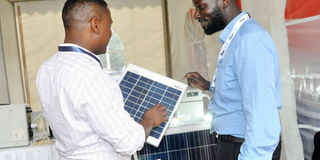Shs30b loans available for solar companies

A sales man from a local solar company explains how a solar panel works at the solar energy exhibition in Kampala recently. Photo by Eronie Kamukama.
What you need to know:
- On completion of the implementation, over 30,000 households (almost 165,000 Ugandans) should be connected to reliable electricity.
KAMPALA. In a move to solve challenges of access to finance, solar companies selling solar systems under pay as you go, pay plan and cash business models will now access loans, Uganda Energy Credit Capitalisation Company (UECCC) has said.
Speaking during the launch of the UECCC working capital facility yesterday in Kampala, Mr John Byaruhanga, board chairman UECCC said the World Bank has availed up to Shs30.6bn to put in place a sustainable financial mechanism for off-grid solar companies.
“The goal of the facility is therefore to enable active participation of the local financial sector in the provision of credit for the off-grid solar subsector,” Mr Byaruhanga said.
The working capital loans will finance the purchase or import of stock for solar home systems and for expenses regarding acquisition of stock such as taxes, import duties, transport and clearing.
Following an expression of interest by local banks, five financial institutions including Barclays Bank, Stanbic Bank, Centenary Bank, Post Bank and Finance Trust Bank will avail loans to the solar companies once UECCC, the implementing agency, extends the lines of credit.
How it works
According to managing director UECCC Ms Specioza Kimera, the facility will work as a revolving fund accessible by participating financial institutions on a first-come first-served basis. The interest rate at which banks will lend the solar companies is not yet clear. UECCC expects banks to provide affordable interest rates to make the loans attractive to solar companies.
“This is going to be at an interest rate of 5 per cent to the participating financial institutions (PFIs) which will go towards maintaining the value of the fund,” Ms Kimera said, adding “But we have capped the margin that the PFIs can add on that to 10 per cent so that at any given time, the solar companies are expected to borrow at a maximum rate of 15 per cent on these local currency loans.”
While some solar company owners appealed for exemption on collateral security, Ms Kimera said PFIs will have to use non-traditional forms of collateral such as the stock of solar companies to secure the loans.
On completion of the implementation, over 30,000 households (almost 165,000 Ugandans) should be connected to reliable electricity. UECCC expects to monitor this minimum target of 30,000 off-grid connections through a quarterly reporting system from solar companies.




